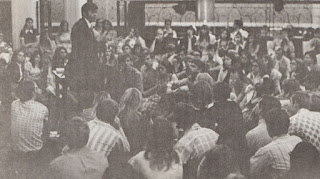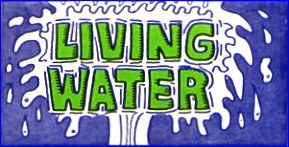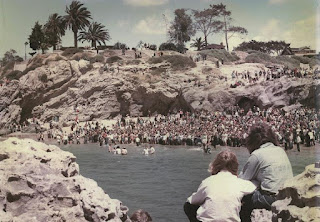This is part 8 of my series on the Jesus Movement as it manifested itself as a spiritual awakening in Orange County, CA. These are my memories, motivated partly by the movie "The Jesus Revolution" about those days.
In Orange County, CA in '71-'73 (when I was there) God was at work in an unusual, and for our generation (and our parents' and grandparents' for that matter) unprecedented way. Suddenly it seemed "Jesus" was more popular than the Beatles, with thousands of young people turning to Him as their Savior. I read that in the first 7 or 8 years of the '70's that Calvary Chapel baptized an average of 500 per month. Just one church. But what was happening wasn't confined to one church. It was a spiritual awakening that spread to other churches. And that included mine...reluctantly, I must say.

Our church on Cambridge in Orange, was just ten miles and less than 20 minutes from "the tent" on W. Sunflower and Fairview in Costa Mesa. The tent, of course, was the temporary home of Calvary Chapel, which had rapidly outgrown its "little country church" building. So, what was happening there wasn't in a vacuum. It was the talk of the town, and the young people who were going there were joyfully spreading the news, both about Jesus and about the home of their new found faith. It couldn't be ignored, even if our church leadership sort of hoped it would be.
I remember asking. I don't remember who exactly I asked, but it was a church leader. And my question was something like, "What about Calvary Chapel?" I knew what I was seeing at school. I knew my first day at school I had been witnessed to by a Jesus freak from Calvary. I knew my high school had no shortage of born again Christians, and mostly the products of the Jesus movement and Calvary. I knew it was different, yet in so many ways the same. So, what of it? I genuinely wanted to know.
Even though the answer was essentially "look but don't touch", the impact of the awakening taking place filtered through our Independent, Fundamental Baptist safeguards to the teenagers at our church. Honestly, telling a teenage me "don't" was a challenge to "do". Our family visited the church on our first Sunday in Orange, and my parents settled on it right away. And why not? And incredibly gifted preacher. A vibrant worship service and a big, growing youth group. Those are indeed, healthy signs. In the short time we were there the church building was expanded twice as it grew.
And this is only my opinion. I'm no expert on "revivals" or "awakenings". But there was a spiritual hunger and fervor in Orange County during those years and it benefited churches all around. Frankly, in my previous five years as a believer I never saw the kind of spiritual passion among the youth in the two IFB churches I attended prior to moving to California that I found there. Nothing close. I don't mean this in some mystical way, but there was "something in the air" in the OC. (I don't think anyone from there uses that term - the OC, btw.)
While the epicenter of the quake was at Calvary Chapel, the shaking was felt far beyond. Seeing other kids excited about their relationship with Christ and about their church - even about their middle-aged pastor (!) emboldened others of us to seek the same passions and excitement. One of our young adult youth leaders taught a series of classes on sharing our faith and then we did just that. On the streets of Orange, in Eisenhower and Hart Parks and even in downtown Santa Ana at night we could be found talking to total strangers about the salvation found in Christ. And we did so with enthusiasm and boldness.
A Friday night youth evangelism service was started at our pastor's urging. The service was totally led by teenagers. We invited our friends. We still sang hymns from the hymnals - but for us that was all we knew. And the Gospel was preached, although feebly. And somehow lost teenagers were saved. It's where I cut my preaching teeth as a 16 year old.
I had been to youth camps in the mountains of Virginia for the previous two summers. They were fun, mostly. But the summer of '71 someone in the church paid for my sister and I to go with our church youth to a camp in the Sequoia National Park. And that week for me was life-changing. It was then and there I put down my stake and said to Jesus that my life was His. And I can't imagine that didn't have something to do - a lot to do with the Jesus Movement.
God was at work in that decade of the '70's and America's youth were more open to Him than ever before. Take a look at Explo '72.
In Chesapeake, VA in the fall of '71 my then high school senior/cheerleader future wife heard the Gospel, and convicted of her need for Jesus' forgiveness and life accepted Him as her Savior. Prior to that, Jesus wasn't on her radar. ('71 was a great year for both of us, a continent apart.) It happened to be in one of those churches that would never have acknowledged the Jesus Movement as being a spiritual awakening. Yet God has this ability to overcome even our skepticism to accomplish His will. That boat was, I believe, lifted by the tide. Sometimes He works His best stuff in spite of us.
For that, I am eternally grateful.
Up next will be my thoughts on the movie.



















